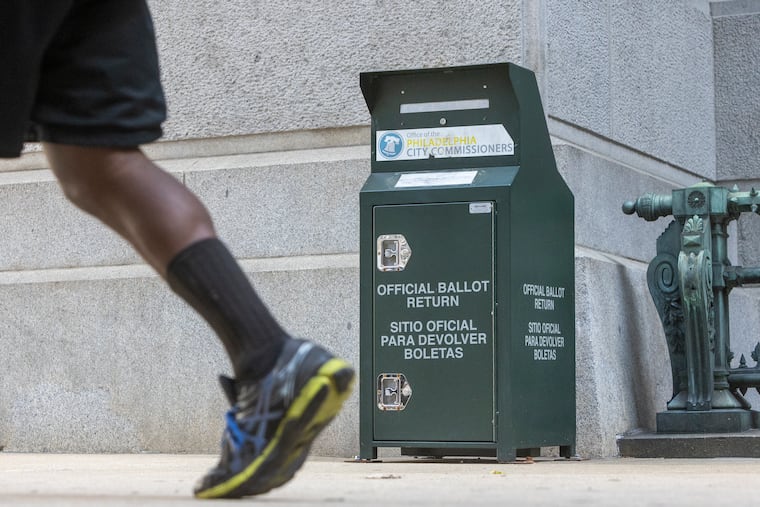More than 1,200 Philly mail ballots may be rejected. Find out if yours is one of them.
Philly officials say more than 1,200 voters so far returned their choices with an incorrect or missing date, no signature, or no privacy envelope.

More than 1,200 mail ballots returned in Philadelphia so far might not be counted because of simple errors made by voters, according data kept by Philadelphia’s Office of the City Commissioners.
The ballots, which account for about 1.3% of the mail vote returns in the city so far, were returned with missing or incorrect dates, or without the required signature or privacy envelope, state and city data show.
Statewide, about 2.2% of ballots in April’s primary were rejected because of flaws. Rejected ballots account for a small fraction of the total submitted in Philadelphia, but in an election that could be decided by less than 1% of total votes, the ballots could play a significant role in determining the fate of the race for the White House.
“Every single vote matters so much and, when we talk about the entire election being decided by perhaps 1% of votes in Pennsylvania, no one can afford to lose any votes,” said Lauren Cristella, the president of the Committee of Seventy, a Philly-based good-government and civic-engagement group.
These are the errors that could jeopardize a ballot, and what voters can do about it:
Which ballots won’t be counted?
In order to be counted, mail ballots must placed in a yellow secrecy envelope provided to voters and voters must sign and date the outer envelope.
Since Pennsylvania approved no-excuse mail voting in 2019, ballots have been set aside because these steps were missed. That includes ballots that are dated incorrectly, such as with the wrong year or a voter’s birthday rather than the date the ballot was sent in.
Whether these ballots should be tossed out has been the subject of litigation for years — and parties are still fighting over whether it is appropriate to set aside a ballot for a missing or incorrect date. For now, state law dictates that election offices cannot count those ballots.
As of Friday, 1,216 Philadelphia ballots had been returned that might not be able to be counted because of these simple voter errors, according to a spreadsheet published by the city commissioners office, which administers elections.
The ballots make up just under 1.3% of more than 94,000 mail ballots returned in the city — a figure that is higher than civic-engagement groups had hoped for but that could still be reduced if voters are able to resolve the issues.
Marian Schneider, an attorney with the American Civil Liberties Union of Pennsylvania, said she expected the proportion of ballots set aside to be dramatically reduced in the coming weeks as voters request new ballots.
“This is a low number,” she said.
How can you find out if your ballot is flawed?
In Philadelphia, the commissioners post a list of voters whose mail ballots might not be counted on their public website, https://vote.phila.gov. Voters can search for their name on a PDF or Excel spreadsheet. The form is regularly updated as ballots are returned to the city.
Outside Philadelphia, voters can reach out to their local election office to verify that their ballots have been received and will be counted. Some, but not all, counties will mark on the state’s online ballot tracking system that a ballot might not be counted because of these issues. This allows voters to check the status of their ballots, and allows campaigns and third-party groups to alert voters to the issue.
According to an analysis by the ACLU, at least 16 counties in the commonwealth do not mark these ballots in the online system.
Can you fix your ballot?
Counties have varying policies for how to fix, or “cure,” mail ballots if they are flagged for issues. And that is also a subject of ongoing litigation.
In Philadelphia, voters cannot directly fix their ballots. However, they can visit an election office in Philadelphia, call the city commissioners at 215-686-1591, or fill out a form online to request a replacement ballot. The replacement ballot must be submitted by 8 p.m. on Election Day. If voters are unable to request a new ballot before Election Day, they can visit their polling place to fill out a provisional ballot.
Outside Philadelphia, voters can reach out to their local election office. Some counties allow voters to fix their original ballots. Others require voters to request new ballots, while some only allow voters to submit a provisional ballot on Election Day.
What if your ballot is flagged for voter ID issues?
As of Friday, an additional 418 ballots in Philadelphia might be set aside this election for unverified voter ID, according to the city commissioners’ data.
These voters either have not submitted acceptable proof of ID to their local election office or their voter registration information does not match the identification they provided.
Voters have until seven days after the election, Nov. 12, to provide an acceptable form of identification.
In Philadelphia, they can do this by either emailing of a photocopy of their ID and an ID verification form to phillyelection@phila.gov or faxing it to 215-686-3398.